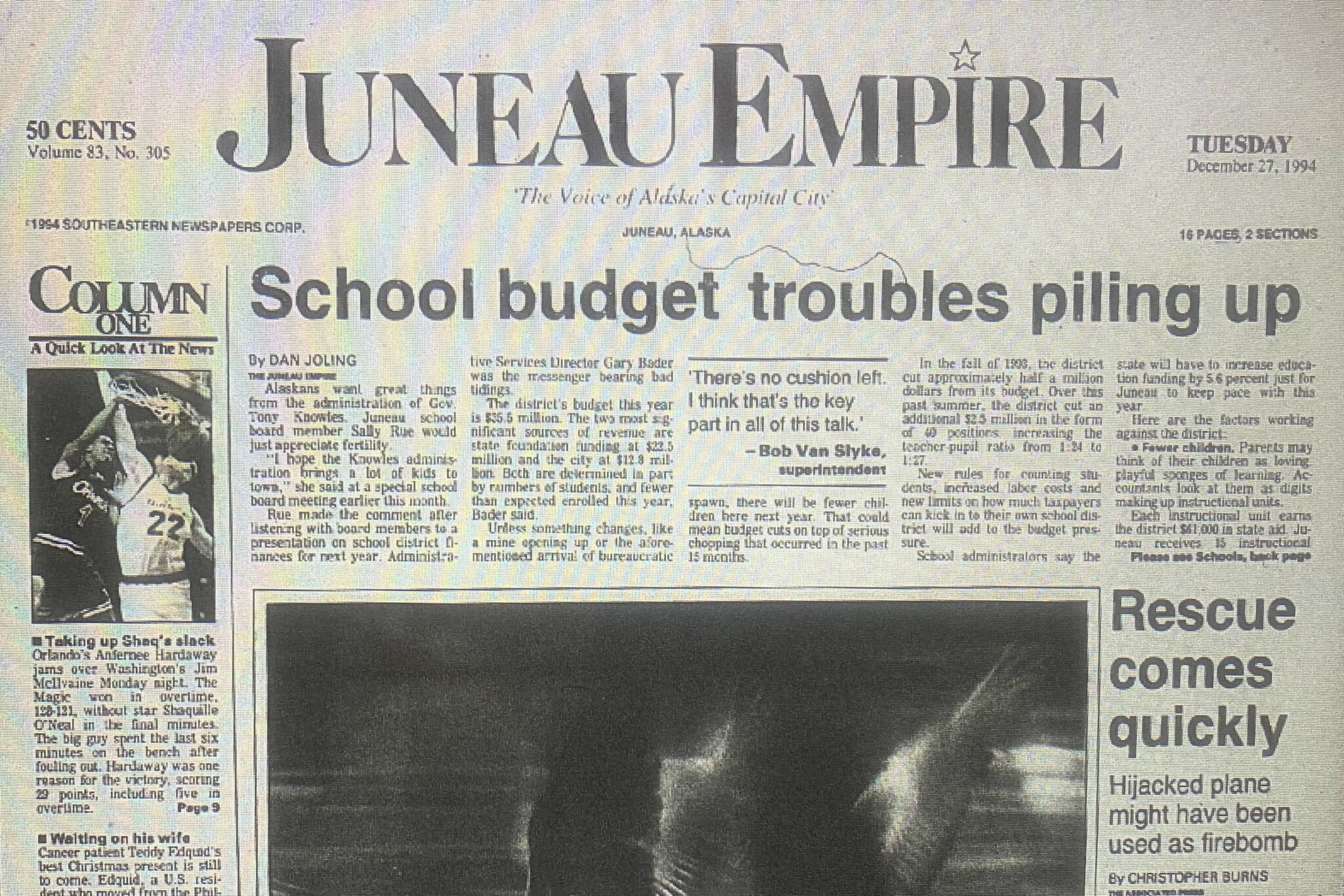Empire Archives is a series printed every Saturday featuring a short compilation of headline stories in the Juneau Empire from archived editions in 1984, 1994 and 2004. They include names, AP style and other content of their eras.
This week in 1984, ‘tis the time of year to think about gaily wrapped gifts and visions of sugar plums, but Juneau City-Borough Assembly members might be thinking instead of the comprehensive development plan and how to help revitalize downtown. Following a recent day-long session at the University of Alaska-Juneau, assembly members came up with lists of their priorities. Mayor Fran Ulmer, who headed the meeting, said the session gave all the assembly members a chance to come up with ideas and solutions. Priorities listed by the assembly members range from getting rid of junk cars (Fred Baxter) to completing the Douglas Island road system (Rich Poor). Some of the priorities mentioned again and again by assembly members included putting effort into the recently completed comprehensive plan, Ulmer said. Ulmer said the assembly members also generally agreed on the need for a plan outlining new major construction projects in the city. A third major concern was funding city improvement for new developments, such as road paving and water and sewer lines.
Today Assembly members also are focusing on big-scale needs following their annual retreat early this month, along with how to pay for projects such as protection from glacial outburst floods, upgrades to utility facilities, and city-owned entities reporting struggles such as Eaglecrest Ski Area.
Original Story: “Assembly makes priority list,” by Betsy Longenbaugh. 12/24/1984.
This week in 1994, Alaskans want great things from the administration of Gov. Tony Knowles. Juneau school board member Sally Rue would just appreciate fertility. “I hope the Knowles administration brings a lot of kids to town,” she said at a special school board meeting earlier this month. Rue made the comment after listening with board members to a presentation on school district finances for next year. Administrative Services Director Gary Bader was the messenger bearing bad news. The district’s budget this year is $35.5 million. The two most significant sources of revenue are state foundation funding at $22.5 million and the city’s $12.8 million. Both are determined in part by number of students — and fewer than expected enrolled this year, Bader said. Unless something changes, like a mine opening up or the aforementioned bureaucratic spawn, there will be fewer children here next year. That could mean budget cuts on top of the serious chopping that occurred in the past 15 months. In the fall of 1993, the district cut approximately half a million dollars from its budget. Over this past summer the district cut an additional $2.5 million in the form of 40 positions, including the teacher-pupil ratio from 1:24 to 1:27.
Today Juneau School District leaders say they have just emerged from what was the biggest financial crisis in the district’s history, due to a $10 million deficit revealed in an operating budget of nearly $80 million in January – with shortfalls of similar amounts projected in future years without drastic action. The district consolidated schools, made numerous cuts to staff and programs, and got the city to take over maintenance costs of some buildings.
Original Story: “School budget troubles piling up,” by Dan Joling. 12/27/1994.
This week in 2004, it doesn’t matter that his four children are all U.S. citizens by birth. It doesn’t matter that he has worked hard and paid taxes to the U.S. government for the past 17 years. It doesn’t matter that his native Mexico has now become a foreign land for him. Juneau resident Ernesto Guillen has to leave, an immigration judge said, because he is an illegal alien. Guillen, who has lived in Juneau since 1996, is scheduled to be deported Feb. 6. He was caught by immigration officers in March. His wife, Gloria Orozco, said immigration officers shouldn’t deport her husband. “He is not a criminal,” she said. Immigration officers said immigrants should not break the law in the first place. “The mere fact that someone has been here for an extended period of time doesn’t give them immediate legal status. The mere fact that they have U.S. citizen children doesn’t give the parents immediate legal status,” said Virginia Kice, Western region spokeswoman of U.S. Immigration and Customs Enforcement. “If someone decides to come here and violates our law, they have to understand that their decision might have ramifications and put their families in a predicament,” Kice said. More than 186,000 non-citizens were deported nationwide in 2003. Other Southeast families besides Guillen’s are facing the same problems.
Today numerous Juneau residents — especially refugees from other countries including Haiti and Ukraine — are worried they may be targeted for deportation when President-elect Donald Trump returns to office. He has promised mass deportations and ending temporary protected status for certain groups will be among his highest and earliest priorities.
Original Story: “Longtime local to be deported,” by I-Chun-Che. 12/28/2004.
• Contact Mark Sabbatini at mark.sabbatini@juneauempire.com or (907) 957-2306.

